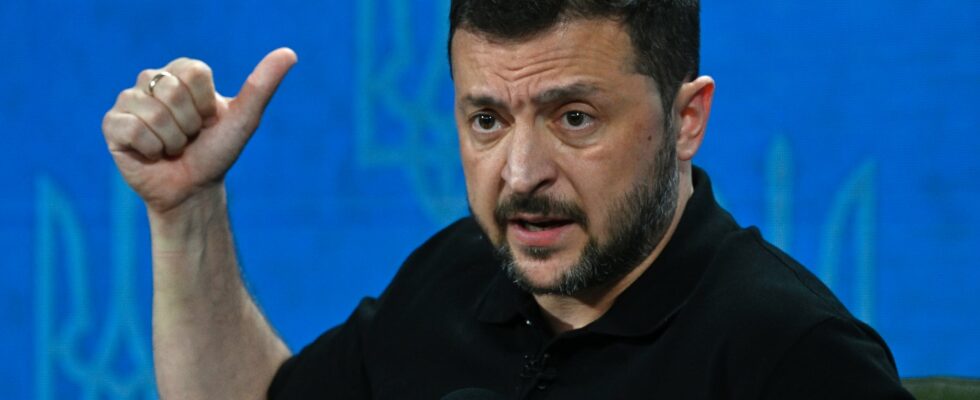“We need new energy,” Volodymyr Zelensky said on Wednesday, September 4. Actions match words: the biggest cabinet reshuffle since 2022 and the start of the war was launched this week in Ukraine. Six senior Ukrainian politicians, including the Minister of Strategic Industries, Justice and the Environment, resigned on Tuesday. “Some of them have been ministers for five years,” insisted the Ukrainian president, as a way of confirming the need for a new direction for the continuation of the conflict with Russia.
But the most important name leaving the government is undoubtedly the Minister of Foreign Affairs and head of Ukrainian diplomacy, Dmytro Kuleba. An excellent orator known for his direct, even incisive style, and his well-chosen sharp phrases, this 43-year-old man was appointed in 2020, becoming the youngest Ukrainian Minister of Foreign Affairs. The son of an ambassador and a career diplomat, Dmytro Kuleba had become a familiar face in the West, where he tirelessly tried to convince people to send his country the military means it needs to resist the Russian army. “When Ukraine has everything it needs, we do not lack the courage and military skills to advance and win,” he proclaimed this summer, after the surprise offensive in Russian Kursk region.
No official reason has been given for his resignation, but a high-ranking source in the Ukrainian presidency, interviewed by AFP, had recently criticized the functioning of his ministry. A statement by Dmytro Kuleba about the historical differences between kyiv and Warsaw had notably provoked a wave of negative comments in Poland in August, marking a new episode of tensions with this key ally.
A senior presidential official told AFP that Dmytro Kuleba and President Zelensky “will discuss and decide” on his future position. According to some reports, the now ex-chief diplomat could be offered an important post in charge of Ukraine’s integration into NATO, which kyiv is aiming to obtain as soon as possible.
“Jealousy”
According to Ukrainian media, Dmytro Kuleba is to be replaced by his first deputy Andrii Sybiga, former deputy head of the presidential administration. The latter’s appointment as number two in Ukrainian diplomacy in April had already been seen as an effort by the presidency to gain better control over this key ministry. Sources within the Ukrainian government, interviewed by AFP, had already been saying for months that Dmytro Kuleba’s influence was limited and that he was under the tutelage of the powerful head of the presidential administration, Andrii Yermak.
For many, the minister’s resignation was also not voluntary and was clearly demanded by the presidency, citing a form of “jealousy” of the government towards other popular figures at the top of the state. Reasons that were also cited when the chief of staff of the Ukrainian army, Valeri Zaluzhny, left in February.
Although he is much less well-known and less publicized than the outgoing minister, Andriy Sybiga, 49, remains considered a heavyweight in Ukrainian diplomacy. He notably held the post of ambassador to Turkey from 2016 to 2021.
Accusations of political interference
In addition to Ukrainian ministers and senior politicians, another dismissal was commented on by the Ukrainian press: that of a deputy head of Volodymyr Zelensky’s administration, Rostyslav Shurma, accused of having abused his position to ensure economic benefits for his family via a government anti-corruption structure.
But it is above all another departure, this time further removed from the presidential prerogatives, which has caused a lot of talk this week: that of the director of the Ukrainian electricity network operator, Ukrenergo. Volodymyr Koudrytsky announced on Tuesday that he had been dismissed from his duties, a choice criticized by members of the supervisory board who denounce political interference.
According to Ukrainian media, the head of Ukrenergo was officially dismissed on the grounds that he failed to protect the country’s essential infrastructure from Russian strikes, while the repeated bombings of Moscow regularly cause power cuts and raise fears of a difficult winter for Ukrainians. An accusation that Volodymyr Kudrytsky denies, claiming to have built dozens of shelters in Ukrainian stations and denouncing a “campaign aimed at discrediting Ukrenergo”. His dismissal follows that, in June, of another official in charge of the electricity network, Infrastructure Minister Oleksandr Kubrakov. Volodymyr Zelensky seems to want to make it clear to anyone who will listen: no position, at any level, is guaranteed if the Ukrainian president is not satisfied with the results.
